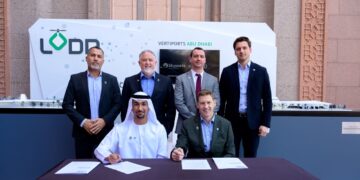The United Arab Emirates (UAE), the host of COP28 2023, is renowned for its astounding urban development projects, where cities like Dubai and Abu Dhabi continuously push the boundaries of avant-gardism and innovation.

However, this rapid urbanization also presents challenges in terms of climate change and sustainability. To tackle this, it is important to routinely use data-driven insights as a tool to promote climate solutions. In recent years, climate change sustainability has become an imperative for the UAE on a scale within the realm of urban development. The president of the UAE, Sheikh Muhamed, stated in his announcement earlier this year, “2023 is the Year of Sustainability in the UAE. Effective climate action requires a shared vision and collective will. As host of COP28, we are committed to fulfilling our role as a global convener and will continue to support action and innovation in the field of sustainability”.
Cities significantly contribute to environmental concerns, and to navigate through this landscape,cities worldwide are increasingly relying on data-driven insights as a potent means to drive climate solutions. As the world’s population continues to increase, our cities are growing at an unprecedented rate. The United Nations estimates that by 2050, two-thirds of the global population will reside in urban areas. The World Urbanization Prospects of 2018 present both opportunities and challenges. The concept of sustainable urban development seeks to create cities that are environmentally responsible, economically viable, and socially inclusive.
The key to achieving sustainable cities lies in understanding and binding the influence of data. Cities are progressively collecting vast amounts of information on energy consumption, traffic patterns, waste management, water usage, and more. This wealth of data enables city planners and policymakers to make educated decisions that reduce environmental impacts and enhance the quality of life for residents.
Smart infrastructure is at the core of sustainable urban development. Data analytics allow cities to monitor and optimize energy consumption in buildings, thereby reducing carbon emissions. For example, smart grids ensure efficient electricity distribution, while real-time data plays a crucial role in enhancing transportation systems, reducing congestion, and promoting the use of public transport, which is vital for reducing greenhouse gas emissions.
Efficient waste management is also a critical aspect of sustainability. Through data analysis, cities can monitor waste generation and collection routes, leading to a reduction in landfill waste and an increase in recycling rates. Sensor-equipped bins and smart waste collection vehicles improve garbage collection schedules, improving efficiency and reducing emissions.
Sustainable cities consider the encounters of a fluctuating climate. Data-driven perceptions enable architects and urban planners to design climate-resilient buildings and landscapes. By analyzing weather data and historical climate patterns, they can create structures that are more energy-efficient and equipped to withstand extreme weather events, such as heavy rains or heatwaves.
Sustainable cities are also actively investing in renewable energy sources, such as solar and wind power. Data analytics play an important role in managing and optimizing these resources. By monitoring weather conditions and energy production in real-time, cities can ensure a stable and efficient supply of clean energy while reducing their reliance on fossil fuels.
While data-driven insights hold great promise for sustainable urban development, challenges do exist. These include data privacy and security concerns, the digital divide, and the need for skilled data professionals. To address these challenges, cities worldwide are encouraged to invest in data infrastructure, foster collaboration between the public and private sectors, and ensure that the benefits of data-driven sustainability initiatives reach all residents, regardless of their socio-economic status.
These cities are not just a vision anymore; they are a necessity in modern times. By tying data-driven insights together, cities may be taking significant strides toward achieving the UAE 2023 sustainability goals. Data analytics is not only transforming urban planning and development but also setting a global example for how data can be a catalyst for positive change in the face of climate change. As we move forward, it is essential to continue innovating, collaborating, and investing in the field of data analytics to create a more viable and climate-resilient future for residents.










